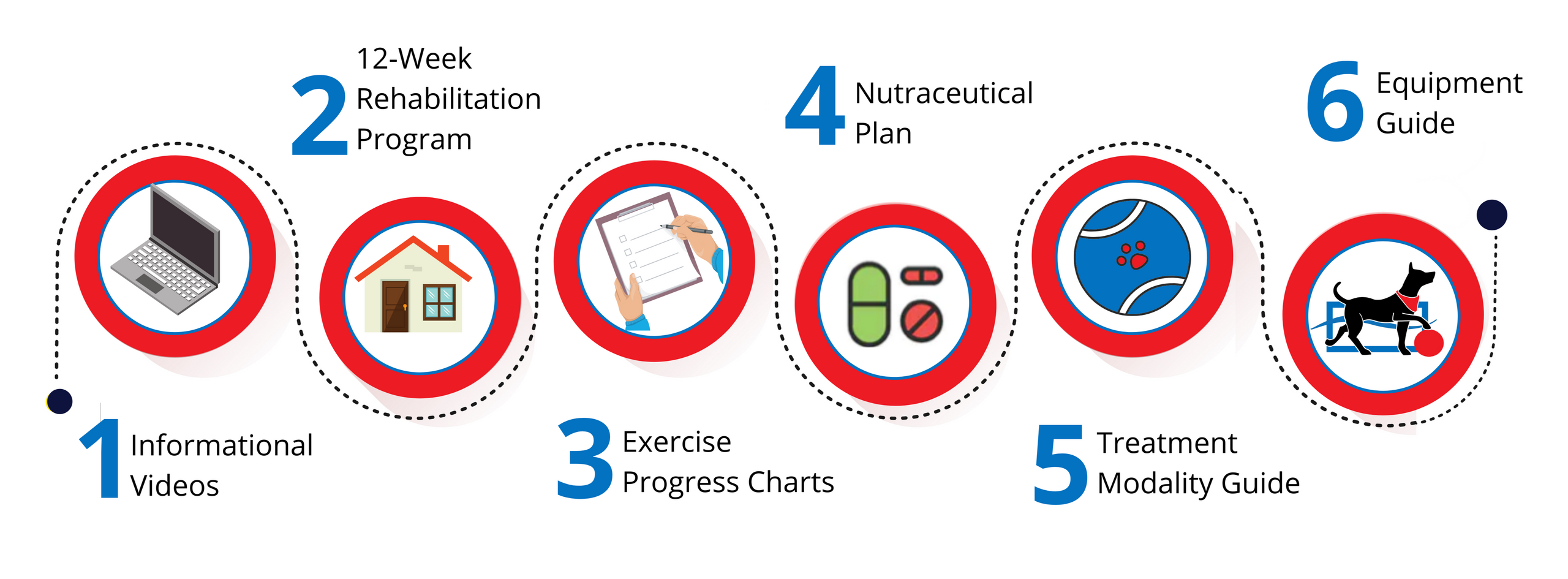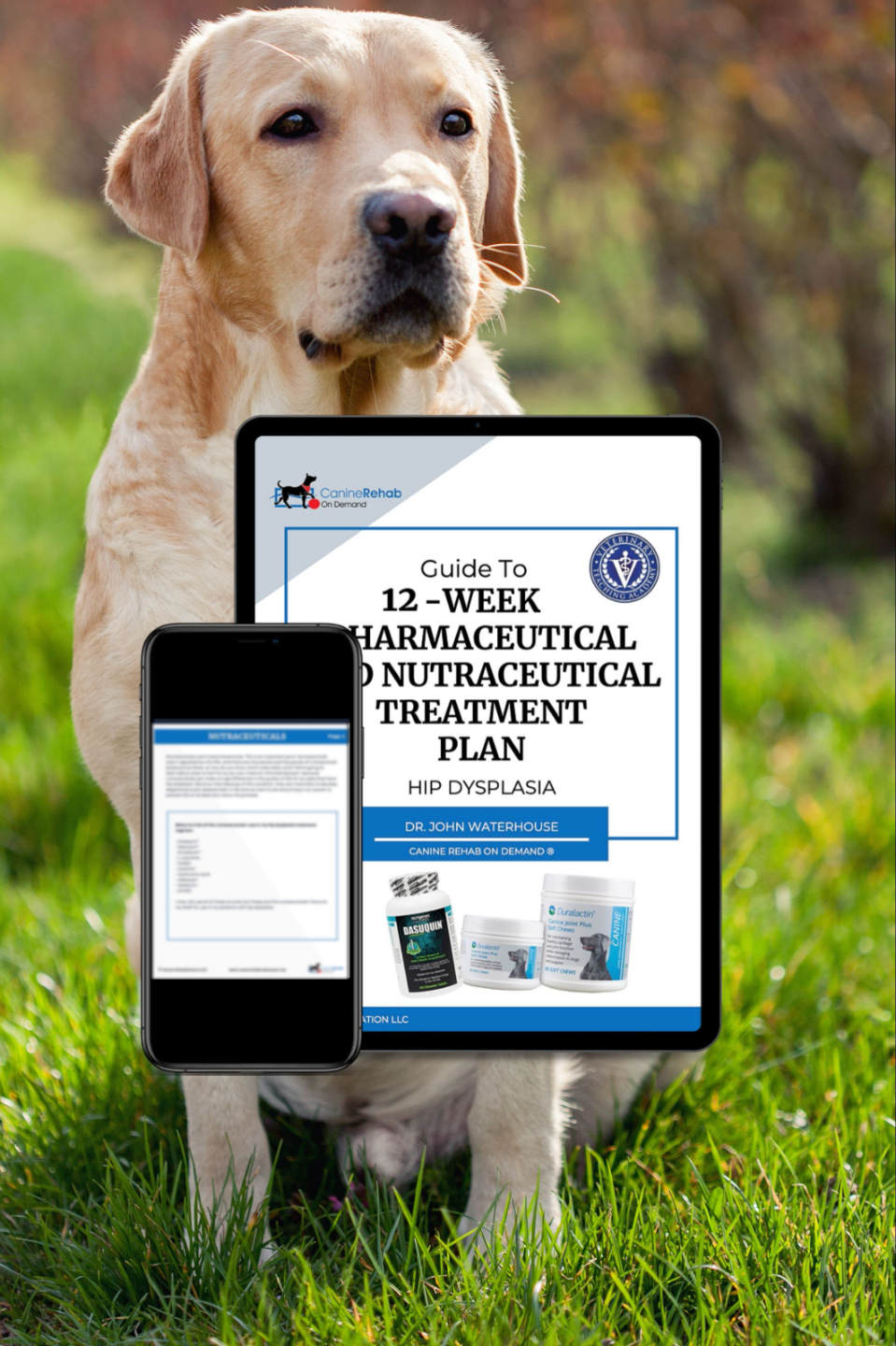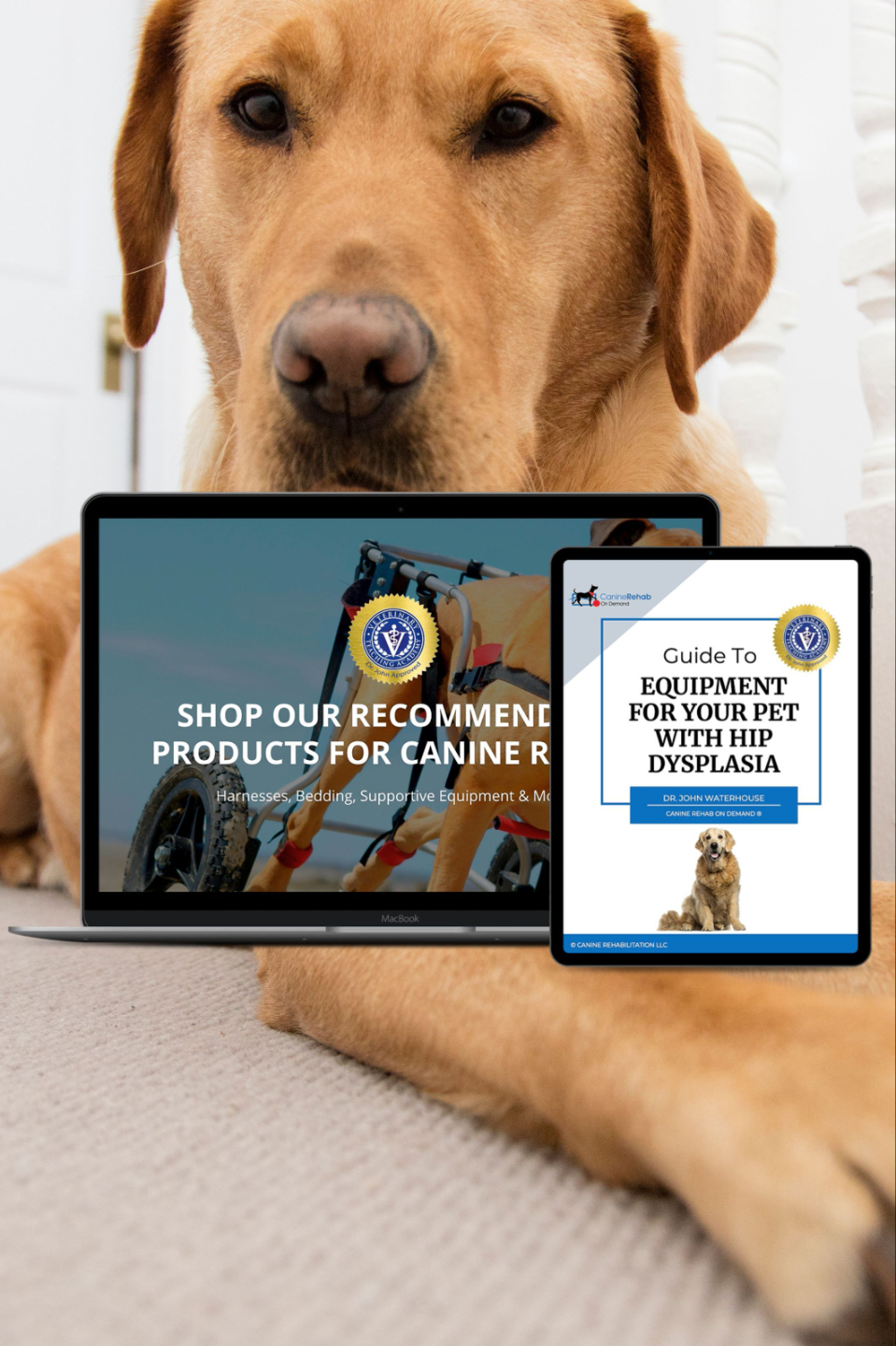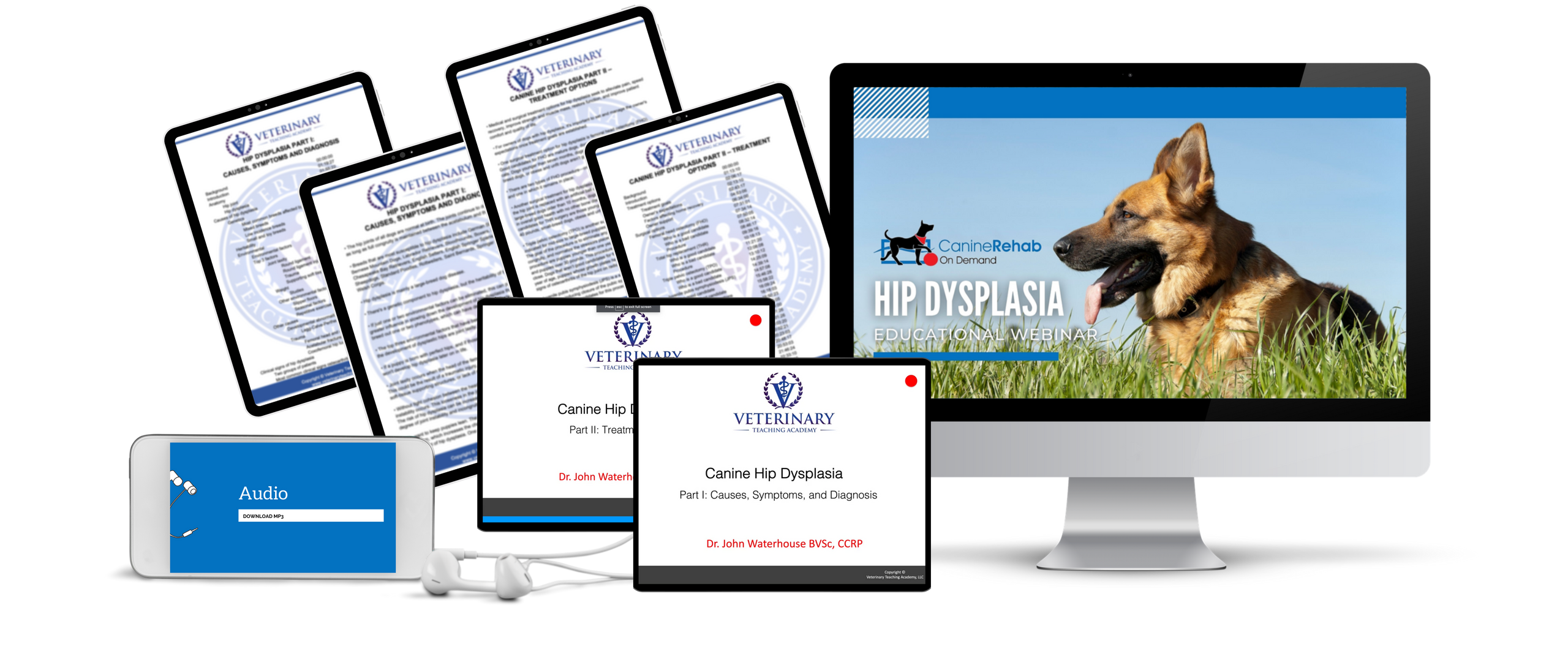KEEP YOUR PET AS MOBILE AND AS COMFORTABLE AS POSSIBLE
![]()
Providing you with at-home rehabilitation programs and therapeutic options specifically designed for pets with Hip Dysplasia.
Help your pet maintain strength and mobility.
Canine Rehab On Demand™ programs were created by Veterinarians and Canine Rehab Practitioners
NICE TO MEET YOU
I'm Dr. John
Co-Founder, Veterinarian and CCRP.
I'm here to help you manage your pet with Hip Dysplasia and provide you with step-by-step guidance to keep your pet as strong, mobile and as comfortable as possible. I share with you the latest studies, tools and resources out there that have been shown to help slow down the progression of this disease...
This program will guide you on:

- What to expect after a diagnosis of hip dysplasia and what to do
- What therapeutic modalities you can try to help maintain strength and mobility for as long as possible
- About the latest research in pharmaceuticals and nutraceuticals that may help slow the progression of the disease
- What supportive equipment and devices may assist your pet in maintaining mobility and comfort
- What exercises you can do to help maintain strength and condition for as long as possible, very simply, step-by-step
Healthy Pets. Happy Pets.
Mobile Pets. Comfortable Pets.
AT-HOME 12-WEEK REHABILITATION PROGRAM FOR HIP DYSPLASIA

Here's how we support you:
Informational Videos
Covering the most common challenges found with Hip Dysplasia
12 Weeks of Exercises with downloadable week-by-week exercise charts
- We give you unlimited access to view the comprehensive and extensive informational training
- Within the video training, we include explanations of the origins of Hip Dysplasia
- We provide information to you to help with treatment decisions, including both non-surgical (conservative treatment) and surgical treatment.
- Information in our videos will guide you on questions you could be asking your veterinarian
- Included in this program are Downloadable MP3 Audio Files
- We provide a Time-Stamped Index to assist in locating information within the videos
- No time to watch the videos? That's ok, we provide you with the Key Point Summary notes.
*This program is by no means, a substitute for veterinary care. In fact, we highly encourage you to seek the advice of your veterinarian first, because all patients' issues and conditions are different and individual.



Rehabilitation Program
Step-by-step weekly exercises to do with your pet at home
Keeping your pet companion as mobile and as comfortable as possible.
- Simple, easy-to-follow, 12-week home physical rehabilitation program for you to do with your pet to help them maintain function, mobility and strength for as long as possible
- Comprehensive instructional and informational videos, photos, and descriptions of each exercise to follow along
- This is the exact same information we teach our veterinary and canine rehabilitation experts in our Canine Rehab Teaching Academy to help them assist their clients and their patients
- Always check with your Veterinarian prior to starting program

Exercise Charts
Downloadable PDF's
Keep track of your daily progress.
- Comprehensive Daily Progress Charts that you can download and print to keep track of your pet's daily rehab exercises
- Keep notes as you go along to inform your veterinarian or rehab practitioner of any issues or triumphs that come up on a particular day with a specific exercise
- Work together with your veterinarian or rehab practitioner to help your pet maintain mobility for as long as possible!
- Know that you are doing everything possible for your pet to give them a quality and comfortable life for as long as possible



Nutraceutical and Pharmaceutical Plan
Downloadable PDF's
Work together with your Veterinarian to come up with the perfect plan for your pet.
- 12-Week Nutraceutical and Pharmaceutical regimen for you to follow at the discretion of your Veterinarian
- Weekly Nutraceutical checklist to follow so you don't miss a dose!
- Any addition of a nutraceutical should be cleared with your veterinarian prior to starting
- Pharmaceuticals should only be prescribed by your veterinarian

Rehab Modality Guide
For Hip Dysplasia
Collaborate with your local rehab professional to help your pet maintain condition and strength for as long as possible.
- Ask your Veterinarian or Rehab Practitioner about additional modalities recommended in our REHAB MODALITY GUIDE which may help with your pet's mobility and comfort
- Within this guide is a sample 4-week treatment program with suggested modalities to be performed by your Veterinarian or your Rehab Practitioner in their practice or office
- Examples may include laser therapy, underwater treadmill, manual therapies, and other protocols which may be effective for your pet's condition



Equipment Guide
with Link to Store
Starting early rehabilitation with the right equipment is important in helping your pet maintain mobility.
- Full guide to recommended equipment for your pet with Hip Dysplasia
- Direct links to what equipment and where to purchase the recommended products to help support your pet
- Each product recommended has been 'vetted' (no pun intended!) and approved by Dr. John

How else we can help:

Blogs, Resources and Articles
Learn about the latest research on Hip Dysplasia.
✔️ We gather as much information we can and create blogs and videos answering your most pressing questions
✔️Dr. John is committed to uncover the latest research on this condition. He strives to break down the information, disseminating the medical info into bite-size pieces making it easy to understand and implement
✔️We collate as much information as we can to provide you with the latest research on Hip Dysplasia
Veterinary Explanation
Canine Hip Dysplasia
Everything You Want To Know
Learn about the causes, symptoms, physical examination, diagnosis, and rehabilitation treatment options for Hip Dysplasia

What you will learn:
Part 1
Causes, Symptoms & Diagnosis
- Description of and Etiology of canine hip dysplasia
- How to identifying the signs and symptoms of canine hip dysplasia and how it is diagnosed
- Tips for performing a physical examination on a hip dysplasia patient
Part 2
Treatment Options
- Discussion of the available treatment options for hip dysplasia
- The therapeutic modalities that have shown efficacy with hip dysplasia
- An example of a 12-week rehab program
Each Module Includes:

Video Webinar
Unlimited access to view replays

Time-Stamped Index
Find what you need quickly and easily

Key Points Summary
Perfect for a quick review of the webinar

Downloadable Audio
A downloadable mp3 audio file (listen from anywhere, on or offline)
Canine Rehab On Demand is here to help.
Keep your pet as strong, mobile and as comfortable as possible.
Show me how
Start today
Management of Hip Dysplasia




Frequently Asked Questions
Do I need to purchase the equipment recommended in the program?
Can you tell me about some of the exercises and how hard it is for people to do the program at home?
Should I do your program or go to my local physical rehabilitation center?
How long will I have access to the program?
About Dr. John Waterhouse
Dr. John Knight Waterhouse is a leading expert in veterinary rehabilitation, pain management, and working dog medicine. As the Founder of the Veterinary Teaching Academy, he is dedicated to advancing veterinary education and empowering professionals with cutting-edge rehabilitation techniques. He serves on multiple advisory boards, including the International Veterinary Academy of Pain Management (IVAPM), Companion Animal Health, and the Denver Metropolitan Zoo.
With specialized training from the PennVet Working Dog Practitioner Program, K9 Medic Training Organization, and the UT CCRP program, Dr. Waterhouse integrates evidence-based rehabilitation, tactical K9 care, and advanced pain management into veterinary practice. Through Canine Rehab On Demand (CROD) and his leadership in the field, he continues to shape the future of veterinary rehabilitation, ensuring better patient outcomes, stronger client relationships, and thriving veterinary clinics.

*This program is by no means, a substitute for veterinary care. In fact, we highly encourage you to seek the advice of your veterinarian first, because all patients' issues and conditions are different and individual.


